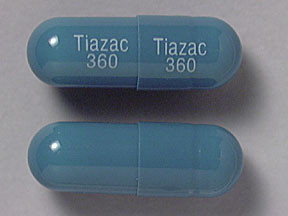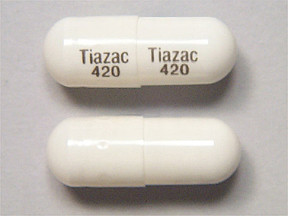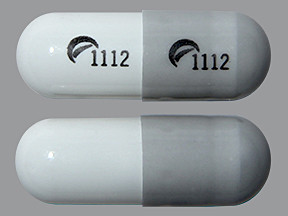DILTIAZEM SUSTAINED-ACTION - ORAL
PHONETIC PRONUNCIATION: (dill-TIE-uh-zem)
COMMON BRAND NAME(S): Tiazac
GENERIC NAME(S): diltiazem HCl
Uses
USES: Diltiazem is used to treat high blood pressure (hypertension) and prevent chest pain (angina). Lowering high blood pressure helps prevent strokes, heart attacks, and kidney problems. When used regularly, diltiazem can decrease the number and severity of episodes of chest pain from angina. It may help increase your ability to exercise. Diltiazem is called a calcium channel blocker. It works by relaxing blood vessels in the body and heart so blood can flow more easily. Diltiazem also lowers your heart rate. These effects help the heart work less hard and lower blood pressure.
How to use DILTIAZEM SUSTAINED-ACTION - ORAL
HOW TO USE: Take this medication by mouth with or without food, usually once daily or as directed by your doctor. Swallow the capsules whole. Do not crush or chew the capsules. Doing so can release all of the drug at once and may increase your risk of side effects. If you have trouble swallowing the capsule, you may open the capsule and carefully sprinkle its contents on a spoonful of soft, cool applesauce just before you take it. Swallow all of the drug/food mixture right away. Do not chew the mixture. Then rinse your mouth and swallow the rinse liquid to make sure that you have swallowed all of the medicine. Do not prepare a supply in advance. Your doctor may gradually increase your dose. Follow your doctor's instructions carefully. The dosage is based on your medical condition, response to treatment, and other medications you may be taking. Be sure to tell your doctor and pharmacist about all the products you use (including prescription drugs, nonprescription drugs, and herbal products). Use this medication regularly to get the most benefit from it. To help you remember, use it at the same time each day. It is important to continue taking this medication even if you feel well. Most people with high blood pressure do not feel sick. For the treatment of high blood pressure, it may take 2 to 4 weeks before you get the full benefit of this drug. This medication must be taken regularly to prevent angina. It should not be used to treat angina when it occurs. Use other medications (such as nitroglycerin placed under the tongue) to relieve an angina attack as directed by your doctor. Consult your doctor or pharmacist for details. Tell your doctor if your condition worsens (for example, your chest pain worsens or your routine blood pressure readings increase).
Side Effects
Precautions
Interactions
Overdose
Images

- color
- blue-green
- shape
- oblong
- imprint
- Tiazac 360, Tiazac 360

- color
- white
- shape
- oblong
- imprint
- Tiazac 420, Tiazac 420

- color
- white
- shape
- oblong
- imprint
- Tiazac 420, Tiazac 420

- color
- white
- shape
- oblong
- imprint
- logo and 1112, logo and 1112

- color
- white
- shape
- oblong
- imprint
- logo and 1112, logo and 1112

- color
- white
- shape
- oblong
- imprint
- logo 1113, logo 1113

- color
- white
- shape
- oblong
- imprint
- logo 1113, logo 1113

- color
- white
- shape
- oblong
- imprint
- logo 1114, logo 1114

- color
- white
- shape
- oblong
- imprint
- logo 1114, logo 1114
Reviews
Faq for DILTIAZEM SUSTAINED-ACTION - ORAL
Diltiazem sustained-action is a medication that belongs to a class of drugs known as calcium channel blockers. It is commonly prescribed to treat high blood pressure and chest pain (angina).
Diltiazem sustained-action works by relaxing and widening the blood vessels, which helps to improve blood flow and lower blood pressure. It also reduces the workload on the heart, making it easier for the heart to pump blood.
Common side effects of diltiazem sustained-action may include dizziness, headache, flushing, constipation, nausea, and swollen ankles. These side effects are usually mild and temporary.
It is important to consult your doctor before taking diltiazem sustained-action during pregnancy. While there is limited information on the safety of this medication in pregnancy, it is generally not recommended unless the potential benefits outweigh the risks.
Diltiazem sustained-action can interact with several medications, including certain antibiotics, antifungal drugs, HIV medications, and other blood pressure medications. It is important to inform your doctor about all the medications you are currently taking to avoid any potential interactions.
Diltiazem sustained-action is usually taken by mouth, typically once or twice daily, as prescribed by your doctor. It is important to follow the dosage instructions provided by your doctor or pharmacist. Do not crush or chew the capsules, as they are designed to release the medication slowly.
Allergic reactions to diltiazem sustained-action are rare but possible. If you experience symptoms such as rash, itching, swelling, severe dizziness, or difficulty breathing, seek immediate medical attention.
It is important not to stop taking diltiazem sustained-action suddenly, as this may worsen your condition. If you wish to discontinue the medication, consult your doctor who will provide instructions on how to safely taper off the medication.
Diltiazem sustained-action is generally not recommended for use in children unless specifically prescribed by a pediatrician. Safety and efficacy in pediatric patients have not been well-established.
Disclaimer
IMPORTANT: HOW TO USE THIS INFORMATION: This is a summary and does NOT have all possible information about this product. This information does not assure that this product is safe, effective, or appropriate for you. This information is not individual medical advice and does not substitute for the advice of your health care professional. Always ask your health care professional for complete information about this product and your specific health needs.
No Reviews Yet